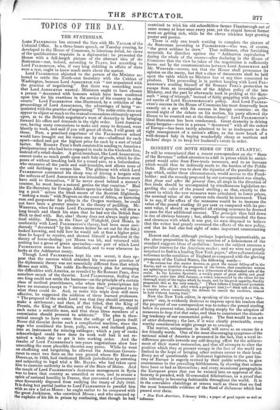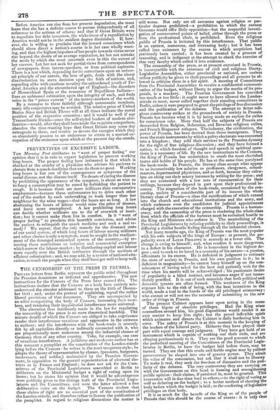HONESTY ON BOTH SIDES OF THE ATLANTIC. IT will be
remembered that a recent correspondent on the " State of the Revenue " called attention to a fall in prices which he antici- pated would arise from Free-trade measures, and to an increase which would thus be indirectly made to the burden of the Public Debt. His object was to show the injustice of the peculiar advan- tage which, under these circumstances, would accrue to the Fund- holder : and the remedy proposed by our correspondent was simply, that from and after the present time, all steps in the direction of free trade should be accompanied by simultaneous legislation re- garding the value of the pound sterling ; so that, exactly to the extent to which the new measures were calculated to lower prices, the nominal value of the current coin should be increased. That is to say, if the effect of the measures would be to increase the value of the pound sterling 25 per cent as compared with its pre- sent value, it should as regarded all existing contracts be decreed to pass for that additional amount. The principle thus laid down is one of obvious honesty ; but, although we commended the force and clearness with which it was put, we were disposed to believe that the writer had greatly overrated the effects of the new policy, and that he had also lost sight of some important counteracting causes.
Honest and clear, although perhaps hopelessly impracticable, as the above proposition is, the very mention of a debasement of the standard suggests ideas of spoliation : hence the subject assumes a peculiar interest for the American reader ; and we were not greatly surprised to find in a leading New York paper,* after a characteristic reference to the condition of England as compared with the glowing prospects of the United States, the following words-
,. So serious has this matter become, so great the recent falling-off in the Excise, and so doubtful the prospects of the future, that considerate writers are agitating so desperate a remedy as a debasement of the standard coin of the realm. In the London Spectator, a weekly paper of great ability and great authority, under date 28th January, a writer, commended by the editor for his thorough study of the topics which he treats, and for his great capacity, frankly propounds this as the only remedy." [Then follows a lengthened quotation from the letter of X; after which a pregnant hint]—" Such talk as this, in a country where numerically the debtors far exceed the creditors, cannot be held without bearing fruit. , Now the New York editor, in speaking of the remedy as a "des- perate" one, is evidently desirous to impress upon his readers that the proposal of our correspondent was to reduce the pound sterling below its present value, instead of being simply for the adoption of measures to keep itat that value, and thus to counteract the disturb- ing tendency of our commercial policy. The first would be an act of utter dishonesty; the last, if it were clearly practicable, every worthy consideration might prompt us to attempt. The matter, unimportant in itself, will serve as an excuse for a few friendly words. One of the most discouraging symptoms of the national mind of America is presented in the fact, that a total in- difference prevails towards any self-denying effort for the achieve- ment of their moral restoration, and that all attempts to alter the position which they at present occupy in the face of the world are limited to the hope of bringing other nations nearer to their level. Every act of questionable or dishonest legislation in the past his- tory of Europe is eagerly revived by their public writers, to give countenance to the prevailing faithlessness, by showing that others have been as bad as themselves ; and every occasional paragraph in
i
the European press that can be twisted into an approval of dis- honesty is paraded, with ill-concealed felicitations, as a proof that this infirmity is becoming fashionable throughout the world. It is in the convulsive clutchings at straws such as these that we find the most lamentable evidence of the flood of dishonour which has passed over them.
• New York American, February 24th ; a paper of good repute as well as influence.
Before America can rise from her present degradation, she must learn that she has a definite course to pursue independently of all reference to the actions of others; and that if Great Britain were to repudiate her debt tomorrow, the wickedness of a repudiation by America would not be in the smallest degree diminished. If, how- ever, she is willing to proclaim that the inward conscience which should alone direct a nation's course is in her case wholly want- ing, and that the highest impulses of her people towards virtue never rise beyond the desire of an average reputation, let her not mistake the mode by which she must ascertain even in this the extent of her success. Let her not seek for partial views from correspondents of newspapers, from tavern-speakers, or from political aspirants. There is a test which, depending for its correctness upon an univer- sal principle of our nature, the love of gain, deals with the nicest discrimination its stern decision upon the faith of nations, and, regarding alike with cautious scrutiny the unburdened youth of Fe- deral America and the encumbered age of England—the disorders of Monarchical Spain or the resources of Republican Indiana— fixes an unbiassed estimation upon the integrity of each, and finds voice in the " prices current " of the money-markets of the world.
By a recourse to these faithful although unromantic monitors, many idle conjectures may be avoided. The relative price of United States Sixes and British Threes will at all times indicate the moral position of the respective countries; and it would be well if our Transatlantic friends—once the self-styled leaders of modern civi- lization—would, after they shall have made the requisite comparison, abandon the time-wasting hope that Great Britain may some day retrograde to them, and resolve to devote the energies which they SO abundantly possess to an endeavour to attain to a mutual oc- cupation of the eminence upon which at the present day she stands.



























 Previous page
Previous page